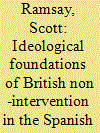| Srl | Item |
| 1 |
ID:
170988


|
|
|
|
|
| Summary/Abstract |
In response to the outbreak of the Spanish Civil War in 1936, the British government adopted and maintained a policy of strict non-intervention throughout the conflict. Previous commentators, to varying degrees, have suggested this policy was largely a product of British hostility towards the Spanish Republic and designed to facilitate a victory for the military rebels who would subdue threats of a communist revolution. This analysis argues that historians have exaggerated British concerns about communism and that Britain saw the Republic as a viable political project that it wanted to succeed. Rather than focusing on British perceptions of only left-wing groups in Spain, this analysis also incorporates perceptions of the extreme right and fascist groups. British concerns about Spain’s political polarisation laid the foundations of the policy of non-intervention, which sought to avert risks of the conflict escalating and solidifying the broader ideological polarisation occurring in Europe during the 1930s.
|
|
|
|
|
|
|
|
|
|
|
|
|
|
|
|
| 2 |
ID:
146807


|
|
|
|
|
| Contents |
The conventional wisdom holds that Spain took only a limited interest in armored warfare until the European powers that intervened in the Spanish Civil War of 1936-39, Nazi Germany, Fascist Italy, and the USSR, demonstrated its importance on the battlefield. The author, tapping into the previously ignored professional military literature in Spain, reveals that, to the contrary, officers in the Spanish army early on took a lively interest in armor, an interest fed not only by what they knew of developments elsewhere in Europe but by the possibility of using tanks and other armored vehicles to advantage in Spain’s colonial wars in Morocco. It was not so much lack of interest that retarded Spanish development of armored units as lack of funds. Over the interwar years, upwards of 50 percent of the Spanish military budget was spent on personnel, particularly the army’s bloated officer corps.
|
|
|
|
|
|
|
|
|
|
|
|
|
|
|
|